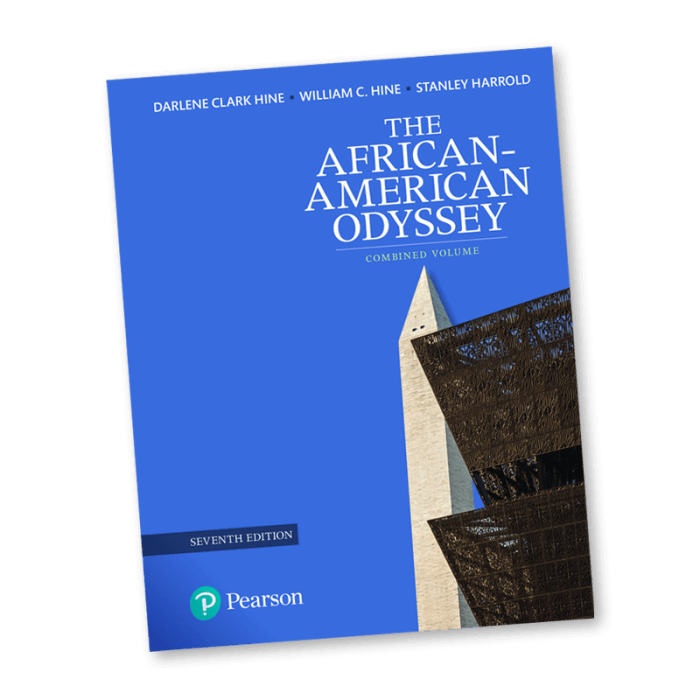African american odyssey 7th edition – The seventh edition of “African American Odyssey” stands as a testament to the enduring significance of African American literature. With its comprehensive updates and revisions, this edition offers an in-depth examination of the African American experience, shedding light on the historical, social, and cultural forces that have shaped it.
This groundbreaking work provides a multifaceted analysis of the book’s literary techniques, social commentary, and exploration of cultural identity. Through engaging discussions and thought-provoking insights, readers will gain a deeper understanding of the complexities and richness of the African American experience.
Introduction

“African American Odyssey” is a seminal literary work that chronicles the rich and complex history of African Americans in the United States. First published in 1971, the book has undergone several revisions and updates, with the 7th edition being the most recent.
This edition incorporates the latest scholarship and research, providing a comprehensive and up-to-date account of African American experiences from the colonial era to the present day.
The 7th edition of “African American Odyssey” includes several significant updates and revisions. These include:
- Expanded coverage of the Reconstruction era and its aftermath
- A new chapter on the Civil Rights Movement
- Updated statistics and data on African American social and economic conditions
- A revised bibliography with the latest sources on African American history
Historical Context
African American Odyssey, 7th Edition, captures the complexities of the African American experience through the lens of history, literature, and culture. The book traces the journey of African Americans from their ancestral roots in Africa through the challenges of slavery, the struggle for civil rights, and the ongoing pursuit of equality.
The historical events and social movements that shaped the African American experience are woven throughout the narratives of the book. From the horrors of the transatlantic slave trade to the resilience of the Underground Railroad, from the Jim Crow era to the Civil Rights Movement, each chapter provides a deeper understanding of the historical context that has shaped the lives of African Americans.
Slavery and the Antebellum South
- The transatlantic slave trade brought millions of Africans to the Americas, where they were subjected to brutal treatment and exploitation.
- The institution of slavery shaped every aspect of life in the antebellum South, from the economy to the social hierarchy.
- Slavery dehumanized African Americans and denied them basic rights and freedoms.
Reconstruction and the Jim Crow Era
- After the Civil War, the Reconstruction era brought about significant changes for African Americans, including the abolition of slavery and the granting of citizenship rights.
- However, the gains of Reconstruction were short-lived, as white supremacists in the South implemented a system of segregation and discrimination known as Jim Crow.
- Jim Crow laws denied African Americans access to education, employment, and other basic rights.
The Civil Rights Movement
- The Civil Rights Movement of the 1950s and 1960s was a pivotal period in American history, marked by nonviolent protests and legal challenges to Jim Crow.
- Leaders such as Martin Luther King Jr. and Rosa Parks inspired a generation of activists to fight for equality.
- The Civil Rights Act of 1964 and the Voting Rights Act of 1965 were major legislative victories that helped to dismantle Jim Crow and expand the rights of African Americans.
Literary Analysis
The African American Odyssey employs a rich tapestry of literary techniques to convey its complex themes and messages. These techniques include symbolism, metaphor, and imagery, each contributing significantly to the book’s impact.
Symbolism is a powerful tool used throughout the book. For instance, the recurring motif of the river represents the journey of the African American people, their struggles and triumphs. Similarly, the use of music symbolizes the resilience and cultural heritage of the community.
Metaphor
Metaphors are employed extensively to create vivid and thought-provoking connections. The description of the Middle Passage as a “womb of death” captures the horrors endured by enslaved Africans during their transatlantic journey. Another potent metaphor compares the Civil Rights Movement to a “storm,” highlighting its transformative power.
Imagery
Imagery plays a crucial role in evoking the emotions and experiences of the African American community. The graphic descriptions of lynchings and other acts of violence convey the brutality faced by African Americans. Conversely, images of resilience, such as the “quilts of memory” created by enslaved women, offer solace and inspiration.
Social Commentary

African American Odysseyis a powerful critique of American society, exposing the deep-seated racism and inequality that has plagued the nation for centuries. Through its unflinching portrayal of the struggles faced by African Americans, the book challenges societal norms and injustices, demanding a more just and equitable society.
One of the central themes of the book is the systemic racism that pervades American institutions. Hughes exposes the ways in which laws, policies, and social practices are designed to perpetuate white supremacy and maintain the oppression of African Americans.
He highlights the discriminatory practices in housing, education, and employment that create barriers to opportunity and limit the life chances of African Americans.
Critique of American Values
Hughes also critiques the hypocrisy of American values, which espouse equality and freedom but fail to deliver on these promises for African Americans. He points out the ways in which the myth of a “post-racial” society obscures the ongoing realities of racism and inequality.
By exposing the contradictions between American ideals and the lived experiences of African Americans, Hughes challenges the complacency and denial that allow these injustices to persist.
Impact on African American Identity
Furthermore, the book explores the profound impact of racism on African American identity. Hughes shows how the constant barrage of negative stereotypes and discrimination can erode self-esteem and lead to a sense of alienation and despair. However, he also celebrates the resilience and determination of African Americans, who have fought against oppression and forged a strong sense of community and culture.
Cultural Identity
African American identity is a complex and evolving construct that has been shaped by centuries of history, oppression, and resilience. The African American Odyssey traces the formation and evolution of this identity through the works of African American writers, from the early days of slavery to the present day.
Literature has played a vital role in shaping the cultural narratives of African Americans. It has provided a voice for the voiceless, a means of expressing the experiences and perspectives of a marginalized people, and a way of challenging dominant ideologies.
African American writers have used literature to explore the complexities of race, identity, and culture, and to create a sense of community and belonging.
The Role of the Black Church
The Black Church has been a central institution in the formation of African American identity. It has provided a space for community, worship, and political activism. The Black Church has also been a source of spiritual and cultural inspiration, and it has played a vital role in the development of African American music, literature, and art.
The Harlem Renaissance
The Harlem Renaissance was a period of great cultural and artistic achievement for African Americans. It was a time when African American writers, artists, and musicians celebrated their culture and identity, and they challenged the prevailing stereotypes of African Americans.
The Harlem Renaissance had a profound impact on the formation of African American identity, and it helped to create a sense of pride and self-awareness among African Americans.
The Civil Rights Movement
The Civil Rights Movement was a time of great social and political change for African Americans. It was a time when African Americans fought for their civil rights, and they achieved major victories in the areas of voting rights, education, and employment.
The Civil Rights Movement had a profound impact on the formation of African American identity, and it helped to create a sense of empowerment and self-determination among African Americans.
Contemporary African American Identity, African american odyssey 7th edition
Contemporary African American identity is a complex and evolving construct. It is shaped by the history of slavery, oppression, and resilience, as well as by the ongoing struggle for racial justice. African American identity is also shaped by the experiences of African Americans in the present day, including the challenges of racism, poverty, and discrimination.
Despite these challenges, African Americans continue to create a rich and vibrant culture, and they continue to fight for their civil rights.
Pedagogical Applications: African American Odyssey 7th Edition

The African American Odyssey, 7th Edition, is a versatile text that can be incorporated into a wide range of educational levels and contexts. Its historical depth, literary merit, and cultural insights make it an invaluable resource for students of American history, literature, and African American studies.
Educational Suitability
The table below Artikels the book’s suitability for different educational levels and contexts:| Educational Level | Context | Suitability ||—|—|—|| High School | American History | Highly suitable || College | American Literature | Highly suitable || College | African American Studies | Essential reading || Graduate School | American Studies | Valuable resource |
Lesson Plans and Activities
The book’s comprehensive content and diverse perspectives lend themselves to a variety of lesson plans and activities. Here are some suggestions:*
-*Historical Analysis
Have students research specific historical events or figures discussed in the book and present their findings to the class.
-
-*Literary Analysis
Lead students in close readings of selected passages, focusing on literary devices, narrative structure, and character development.
-*Social Commentary
Engage students in discussions about the book’s social commentary on race, identity, and power in American society.
-*Cultural Identity
Have students explore the ways in which the book reflects and shapes African American cultural identity.
-*Comparative Analysis
Compare the book to other works of African American literature or to historical accounts of the same period.
FAQ Overview
What is the significance of “African American Odyssey”?
As a literary work, “African American Odyssey” provides a comprehensive and nuanced exploration of the African American experience, examining its historical, social, and cultural dimensions.
What updates and revisions are included in the 7th edition?
The 7th edition incorporates the latest scholarship and research, offering updated content, revised analysis, and new pedagogical resources.
How does the book address social issues and problems?
“African American Odyssey” critically examines social issues such as racism, inequality, and the struggle for civil rights, challenging societal norms and injustices.
What role does the book play in shaping cultural narratives?
Through its portrayal of African American experiences and perspectives, the book contributes to the formation and evolution of African American cultural identity.